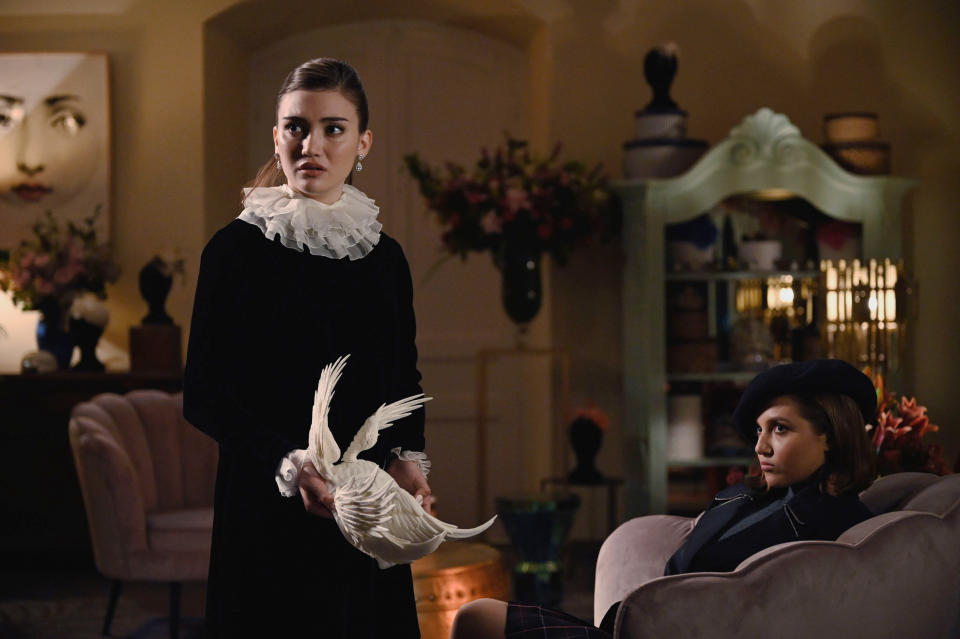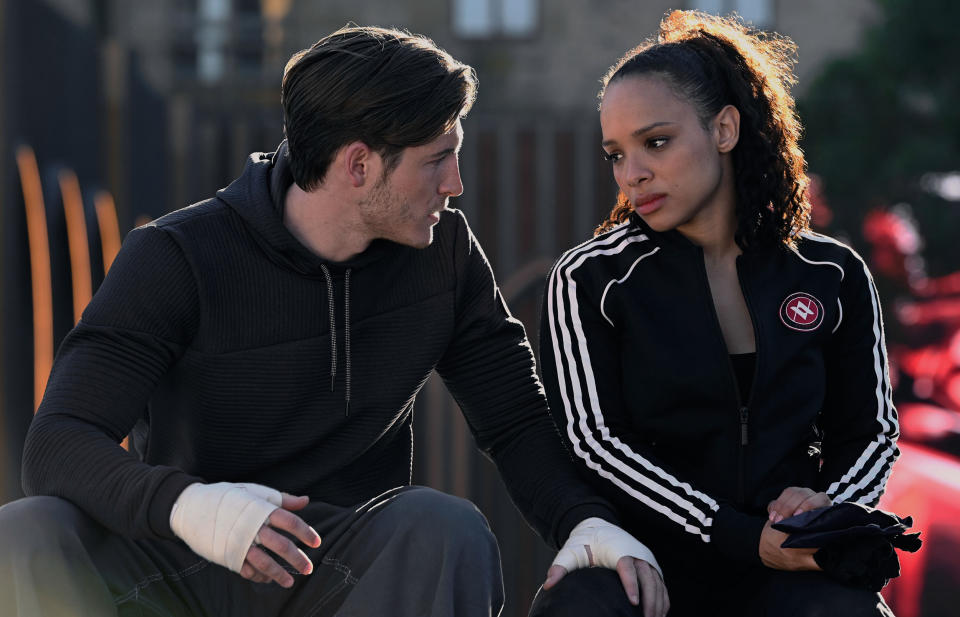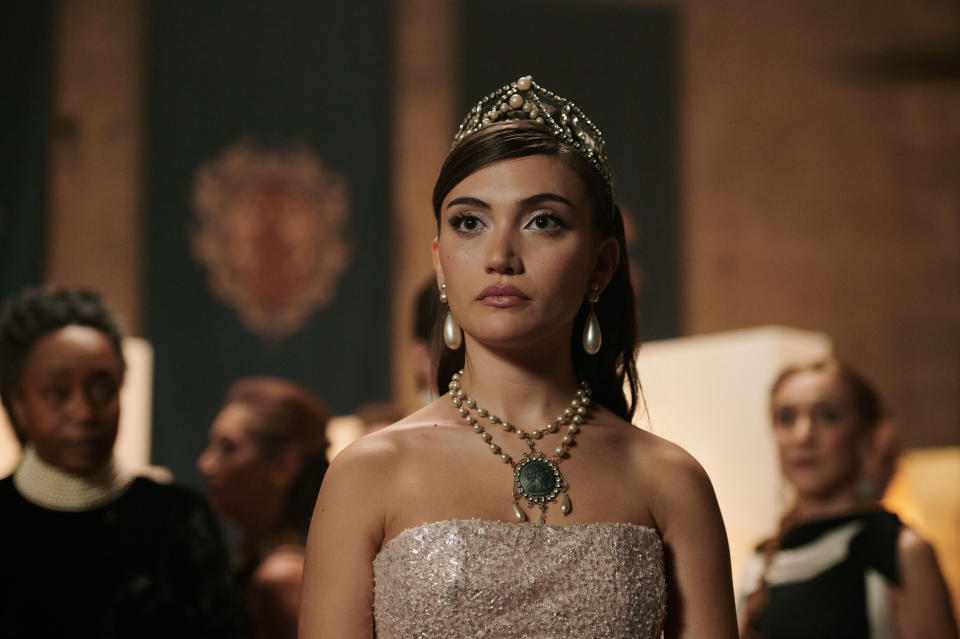Vampire Academy' Stars Say Show's Diversity Shouldn't Be 'A Thing'
- Oops!Something went wrong.Please try again later.
Stay in the sun, and whatever you do, don’t breach the wards.
That’s the best advice Daniela Nieves and Sisi Stringer can give TODAY for avoiding Strigoi, the red-eyed vampires whose monstrous bloodlust threatens their characters’ worlds in “The Vampire Academy,” the first four episodes of which release on Sept. 15 on Peacock.
Based on the novels by Richelle Mead, “Vampire Academy” is set in a world populated by many different kinds of vampires, many of whom spend their time serving looks within the magically protected walls of St. Vladimir Academy.
In case you missed the YA novel and 2014 movie adaptation craze, here’s the low-down on “Vampire Academy”: A conventionally evil group of vampires known as the Strigoi are hunting down their elitist, magic-wielding Moroi vampire counterparts. Only the Dhampir, a race of human-vampire hybrids, stand a chance of protecting the Moroi from danger, and they’re expected to lay down their lives to do so.
For their part Strigoi are what you expect of vampires; immortal, sunlight-burning blood freaks with no humanity and an immutable obsession with all-black outfits. Royal Moroi, non royal Moroi, and Dhampir, on the other hand, exist in an oppressive and archaic social system whose foundation is built off of making the Dhampir disposable.

As in the books, “Vampire Academy’s” main villain is hierarchy. Translated to screen by young adult TV phenoms Julie Plec (“The Vampire Diaries”) and Marguerite MacIntyre (“The Originals”), “Vampire Academy” is a contemporary political fairytale that finds itself amidst the precarious balance between tradition and progression, highlighting the sacrifice and hypocrisy sitting at the core of both ideologies. It is thrilling and enrapturing in its rumination on relationships and the way trauma and grief attempts to isolate us — all while serving some of the most exquisite fight choreography around.
But there is a key difference in the transition from book to screen: Mead’s deuteragonists Rose (played by Stringer) and Lissa (played by Nieves) are now women of color. In fact, almost the entire cast is played by people of color.
This casting comes at a time when the presence of non-white people playing mythological characters in works like “The Little Mermaid,” “Lord the Rings: Ring of Power” and “House of the Dragon” has drawn racist criticism.
The stars of “Vampire Academy” see their series as another chance to show people of color can be mermaids, elves, or blood-drinking creatures of the night, too — with the intention that, with enough portrayals, we can rive a stake through the debate.
TODAY: Sisi, you were a fan of the books. Walk us through when you found out you’d be playing Rose.
Sisi Stringer: (Daniela and I) did a chemistry read together and I came out feeling really good. Did one with Keiron (Moore), came out feeling really really good and I was like “I might actually do this!” This character I love and have loved since I was fourteen. And then I got the call and I screamed, cried, danced, all of that.
I love it, all your neighbors are like, “What’s going on?”
Stringer: Exactly!
Fantasy as a genre isn’t necessarily known for its diversity. What do you think the impact will be for audiences, specifically young women of color, who see two badass vamps of color fighting and being friends?
Daniela Nieves: You never really see diversity in fantasy so —
Stringer: And if it is there then people push back. People complain about it and get upset which is not great.
Nieves: Yeah. I think the goal is for it to not even be a thing anymore. For it to be so normal to watch a fantasy show or any show that you love and see all kinds of people that look completely different, that sound completely different. And just make you feel less out of place. Like there’s people representing you somewhere.

Stringer: Representation is really important. Not just for someone to see themselves, but for other people to see that specific race and identity and be…
Nieves: Exposed to it.
Stringer: Exactly. And it’s really cute, the fans are really really excited. I got a letter from this beautiful girl on Twitter like, “It’s so cool to see a Black girl be sassy, powerful, and valued.” We know exactly how they feel and that makes us feel good.
The two of you play characters from such different social standings. What aspect of that relationship did you feel was most important to get in this season?
Nieves: Lissa goes through this thing where she’s privileged her whole life. Even though she’s been through all this tragedy, her life will never be difficult compared to Rose and all these Dhampirs. It’s always been so easy (for Lissa) to be like, “I don’t want to do anything political. I just want to sit back and enjoy my privilege and live comfortably." As the goes on, you see Lissa say, “I can’t afford to not be political. I can’t afford to not be involved. I have to see what’s going on.” I think it’ll be really great for people to watch that and see a little bit of themselves in that, especially young people who may find politics annoying. It’s very relevant right now.

Stringer: I guess she’s checking her privilege. Being apolitical is a privilege in and of itself.
Nieves: Yeah.
Over the season, we see a dynamic where the younger characters face extreme trauma and have to keep it pushing for the preservation of the world. I’m wondering how you feel that story will resonate for a post-pandemic audience.
Stringer: Trauma is the human experience. I think every single person in the world has trauma. It’s great to see a character you love overcome their adversity, and see characters supporting each other through trauma. Lissa has so many mental health issues and Rose is there trying to help her but it shows how difficult it is, not just going through it but to try and help someone else go through it.
Nieves: I remember there was a moment, I was going through a personal thing and I was in my Lissa costume and makeup and it was the weirdest feeling. It was like Lissa was a person and she was giving me a hug. When you watch any type of fantasy show you get lost in the world and attached to these characters. I hope people get attached to us in that way.
This article was originally published on TODAY.com

